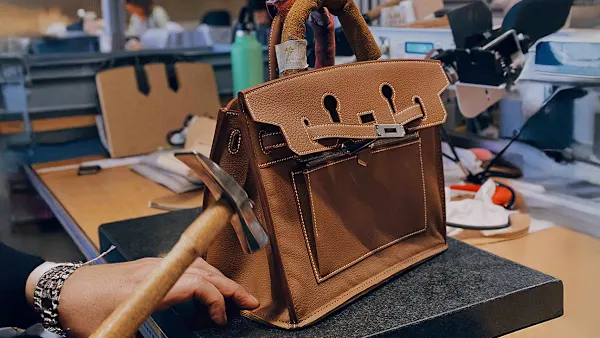Copyright channelnewsasia

“We are fortunate enough to have incredible customers asking for our bags, and we can’t supply the demand,” Fournier said. “Not because we don’t want to, but because the way we produce our bags takes time. And we don’t want to force the pace, the speed of this development. We make no compromise on quality.” Luxury here is not engineered scarcity, but time itself. MULTIPLYING SLOWNESS Yet faced with surging demand, Hermes has chosen its own unique path: Not to accelerate production, but to multiply slowness. “We roughly open one new workshop per year,” said Fournier. “We have to recruit the right people and train them up. Every artisan is trained over 18 months, and they are still learning every day.” Each site is intentionally capped at around 260 artisans, a scale designed to preserve community, avoid the alienation of mass production, and protect the sanctity of the craft. Many artisans arrive from unrelated fields: Caregiving or teaching for example, and they enroll in L’Ecole Hermes des Savoir-Faire for training and apprenticeships before starting at a workshop. They are not chosen for leatherwork experience, but for dexterity, humility, and the ability to work collectively. In the hands of these artisans are movements that date back to at least 1837 when the house was founded. THE FRENCH CULTURAL FRAMEWORK What underpins Hermes’ philosophy is not just a commitment to craft, but to a humanist view of labour, one that rose out of the same cultural framework that gave France its national motto: Liberté, égalité, fraternité (“liberty, equality, fraternity”). In practice, this means treating production not as a cost to be minimised but as a dignity to be sustained. Workshops are built not as faceless factories but as communities where human ties form part of the structure. At the end of 2024, Hermes employed over 25,000 people worldwide, of whom over 15,000 are based in France — more than 60 per cent of its workforce. That same year, 2,300 new employees joined what the maison calls its community of Hermes men and women. Seventy per cent of all objects are made in France, across 60 sites in 11 regions — each organised into hubs, where savoir-faire (or know how) is passed on locally. “We try to look for areas in France where there was a manufacturing tradition,” said Fournier. “And so we create these jobs as it’s part of our social responsibility.” Every new workshop creates around 300 jobs on average, a steady regeneration that extends far beyond the maison itself. The result is local renewal: Stable employment, comfortable working conditions close to home, and the pride of belonging to a metier with both heritage and future. Hermes does operate 15 other production sites in Switzerland, Italy, the UK, the US, Portugal and Australia, but the centre of gravity remains in France. Choosing to grow slowly, at human scale, within the country’s cultural and social fabric is as much an economic strategy as it is a declaration of values. What Hermes is offering, then, is not just a product but a worldview: That human skill, time, and care are still worth something in an age that’s rushing to forget them. “In recent years, people have become dissatisfied with obsolescence,” Fournier said. “Dissatisfied with marketing promises with nothing behind. They want authenticity, quality, and a story to tell.”



